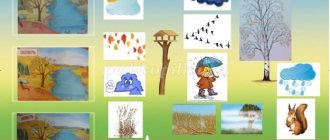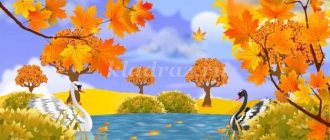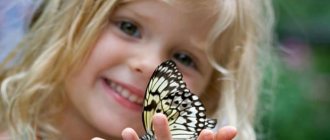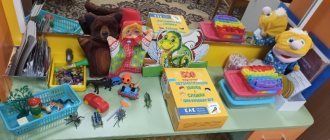AUTUMN. K. Balmont
The lingonberries are ripening, the days have become colder, and the bird's cry makes my heart sadder.
Flocks of birds fly away, beyond the blue sea. All the trees shine in a multi-colored dress.
The sun laughs less often, There is no incense in the flowers. Soon Autumn will wake up and cry awake.
Task for children:
Usually kids ask when reading this poem, how will autumn cry? After all, she is not a person! Try discussing with your children what tears look like (like raindrops). Admire how beautifully the poet spoke about rain! As if it were autumn that was crying (the key word here is “as if” - it helps children understand the figurative meaning of this expression).
AUTUMN-SEAMSTESS. T. Gusarova
So that the little earth can spend the winter without hassle, Autumn sews a patchwork blanket for her. Carefully sews the leaf to the leaf, adjusts the stitch with a pine needle.
Leaves to choose from - any will come in handy. Here the purple one lies next to the crimson one, Although the seamstress really likes the golden one, the brown one, and even the spotted one, will do.
They are carefully held together by a thread of spider web. You won't find a more beautiful picture than this.
BORING PICTURE. A. Pleshcheev
Boring picture! The clouds are endless, The rain keeps pouring down, Puddles by the porch... A stunted rowan tree gets wet under the window, The village looks like a gray spot. Why are you visiting us early, Autumn? The heart also asks for Light and warmth!
Task for children:
- Why is autumn called dull? What mood is conveyed in this poem? How is it different from previous verses?
- What is autumn like for you - joyful or sad? Why? Do you like autumn? What do you like about her and what do you not like so much?
- If you were a poet, what mood would your poem about autumn convey?
Consultation “Golden Autumn or what to tell children about autumn”
Fedotenkova Yulia Vladimirovna
Consultation “Golden Autumn or what to tell children about autumn”
It is believed that autumn is a dreary time of year, but just look at this magical transformation of nature, bright colors and freshness. This is an extraordinary and wonderful time of year! Children know how to enjoy this period no less than others. Even taking into account the fact that you need to go to school or kindergarten again. When August ends, and the breath of autumn is already felt more and more strongly, it’s time to tell your children about autumn , about this delightful time of year in more detail.
Metamorphoses of nature in autumn
Observing nature in autumn brings vivid impressions. The hot summer is replaced by a cool and rainy autumn . It can already be felt in everything. Nature has made sure that everyone can see and feel the changes taking place around them.
How the weather changes in autumn
Gradually, the air temperature begins to fall, the days become shorter, and the nights become longer and colder. The sun no longer shines as brightly and does not rise high in the sky as in summer. Often the sky is covered with black clouds and heavy rains fall. In the morning you can see a white haze - this is fog.
The leaves begin to fall, the wind tears leaves from the trees, which cover the ground with a bright carpet. Short Indian summer
- these are several sunny and warmest days that seem to remind us of summer.
Frosts are possible at night by mid- . At the end of autumn you can see the first crust of ice on puddles, the first snowflakes. A cold wind is blowing, and it’s about to start snowing.
How animals , birds and insects
Of course, animals, birds and insects sense the approaching cold, so they begin to prepare for winter. Some are making supplies for the winter, others are building or insulating their homes. Mice, hamsters, rats, and moles store potatoes, nuts, beans, seeds and grains in their burrows. Squirrels hide mushrooms, nuts and cones in secluded places. Snakes, frogs, toads, snails, lizards hid in secluded places.
Many animals in the forest change their beautiful winter coats to a lighter, fluffier and warmer winter coat, so that they feel warm in the snow and no one can notice.
And some animals are active all year round; they are quite capable of finding food for themselves even in winter. For example, these are elk, fox, wolf and hare. Migratory birds fly south.
Some insects, for example, ladybugs and dragonflies, also travel to warmer climes. Bugs, midges and butterflies hide in the bark of trees, cracks and all kinds of crevices, ants fill up all their entrances to the anthill and begin to prepare for hibernation.
How plants grow
Plants, like the animal world, are preparing for winter. In early autumn everything around turns golden , the leaves shimmer with bright colors, the leaves begin to fall - the wind tears the leaves off the trees and now on the ground you can see a carpet of bright autumn leaves .
The birch tree is the first to begin to shed its leaves, then the leaves of maple, linden, rowan, bird cherry, oak and other trees turn yellow. The leaves are painted in different colors, because the sun shines less and less often, the leaves do not have enough of it, and it becomes cool. Only coniferous trees that have thin needles instead of leaves remain green - pine, spruce, fir.
The grass has turned yellow and withered, and although chamomile, violet, and clover are still blooming here and there, in mid- autumn they will wither until next summer.
One of my favorite fairy tales, “The Adventures of an Oak Leaf,” about autumn
.
Features of human activity in autumn
In early autumn, harvesting in gardens, orchards and fields is still underway. They collect beets, carrots, cabbage, potatoes, and pumpkins. And with the help of special machines called a combine, the bread is harvested.
Poems about vegetables, berries and fruits
Riddles from the garden
After harvesting, it’s time to care for the soil with fertilizers that will help the soil recover for the next sowing. After fertilizing, the soil must be re-plowed so that it freezes in winter and prevents pests and weed seeds from growing.
Winter crops are also sown, for example, parsley, dill, carrots, wheat and golden rye . Garden trees and shrubs must be thoroughly watered so that the moisture helps them withstand frost. In the city at this time, you can plant young trees and shrubs, treat trunks for the winter from insects and hares.
With the arrival of autumn, children go back to school or kindergartens, a new school year begins, and parents return to the usual working rhythm of life. In the fall, everyone always warms up and puts on warm clothes so as not to catch a cold or get sick.
A little about sports in the fall
Autumn is a favorable time for sports. The carefree vacation time is already behind us, which means you can work and train properly.
In autumn, our body especially needs physical activity. When the sun hides, we feel sad, with the arrival of cold weather we feel tired and melancholy, and sport is an excellent cure for the autumn blues and boredom . Moreover, it is no longer so hot and there are many options for sports available.
We still have access to running in parks, roller skating, cycling, and exercise in the fresh air. It would be a good idea to sign up for a swimming pool - it strengthens the whole body and improves mood, especially since children simply adore water treatments. For unusual activities, we recommend horse riding. Firstly, for children this is one of the best therapies, positive emotions, walks in the fresh air and magnificent autumn nature . This, just like swimming, strengthens all muscle groups, improves the baby’s immunity and improves metabolism. Children are usually absolutely delighted with horses too!
Autumn in fairy tales
Autumn itself is like a fairy tale. The trees are magically painted in different colors, the forest is illuminated with golden and crimson shades . How could one manage without good and instructive reading at this time of year?
Autumn fairy tales help children better learn about what happens in the fall , how nature, flora and fauna change, and how everyone around them prepares for the coming winter. We advise you to read the following fairy tales with your child:
• Fairy tale by N. M. Gribachev “Red Leaves”
about how the animals in the forest were preparing for winter.
• Fairy tale by K. D. Ushinsky “The Bee and the Flies”
about how the bees enjoyed one of the sunny
autumn days .
• Fairy tale by Nikolai Sladkov “ Autumn is on the threshold ”
also about how animals and birds greet
autumn and prepare for the winter cold.
• Fairy tale by Vladimir Suteev “Apple”
about how forest dwellers fairly divided
the autumn harvest .
Speaking about Suteev’s fairy tales, it’s hard not to remember your favorite cartoons based on his fairy tales:
• Fairy tale by K. V. Lukashevich “ Autumn ”
.
• Fairy tale by I. S. Sokolov-Mikitov “Before Winter”
.
• Tales of Tatyana Domarenok “ Autumn ”
,
“Tired Rain”
and
“
Golden Autumn in the Schoolyard ” .
Wonderful fairy tales will introduce children to autumn , and will also teach kindness and justice. Read my fairy tales in the section “Fairytale Kingdom”
.
Songs and poems about autumn
Poets have created an incredible number of beautiful poems dedicated to the bright and beautiful autumn . Poems for children by different authors are collected in the article “ Autumn creativity of famous poets”
.
And a beautiful melody, coupled with rich text about autumn for children, awaits you in the article “Beautiful, kind, gentle music of autumn "
.
Stories about autumn
Books by wonderful writers give eloquent answers about what to tell children about autumn Among the great stories about autumn for children, we recommend reading the following stories autumn days :
1. E. Yu. Shim “Fives”
. A short story about the beginning of the school year and the wish to study with straight A's.
2. V. V. Bianchi “Forest newspaper. Autumn "
.
The story of how autumn .
3. I. S. Sokolov-Mikitov “Forest in autumn ”
.
This story tells how the forest changes with the onset of autumn .
4. V.V. Zankov “Why do tree leaves change color and fall off in autumn
.





